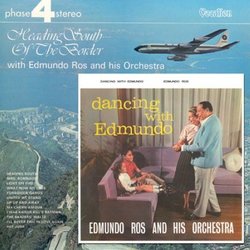| All Artists: Edmundo Ros Title: Dancing With Edmundo Heading South of the Border Members Wishing: 0 Total Copies: 0 Label: Dutton Vocalion UK Original Release Date: 1/1/2007 Re-Release Date: 9/11/2007 Album Type: Import Genres: Jazz, Pop, Latin Music Styles: Latin Jazz, Easy Listening, Latin Pop Number of Discs: 1 SwapaCD Credits: 1 UPCs: 765387433420, 0765387433420, 076538743342 |
Search - Edmundo Ros :: Dancing With Edmundo Heading South of the Border
 | Edmundo Ros Dancing With Edmundo Heading South of the Border Genres: Jazz, Pop, Latin Music
|
Larger Image |
CD Details |
CD ReviewsPop Songs and Latin Favourites in Dance Tempo P. J. Wallace | East Yorkshire, UK | 12/04/2007 (5 out of 5 stars) "Edmundo Ros was, of course, Britain's leading exponent of Latin American music and styles from 1940 until he disbanded in 1975. Not only was Edmundo a household name in the UK, but his music appealed to a worldwide market. His recordings sold particularly well in the USA, Japan and Latin America. You cannot help be struck by the excellence of his orchestra, the high standard of musicianship, and the adventurous choice of material. The second album, Heading South Of The Border (Tracks 17-28) from 1970, demonstrates that latter point. Edmundo took on the hits of the day such as "Hey Jude", "Mrs Robinson" and "Light My Fire", added a Latin beat, and took them onto the dance floor. This collection also includes an even more unlikely latinised number "The Skater's Waltz". These adaptations are all done tastefully and with originality.
The album "Dancing With Edmundo" (originally released in 1960) must rank as one of his best, and opens with his signature tune "Cuban Love Song". There are some familiar items like "Brasil", "Spanish Gipsy Dance" and "Copacabana" which Edmundo recorded more than once. Edmundo made his first recording of "Te Quiero Dijiste" at his very first recording session made under his own name back in April 1941. Some melodies were worth keeping in his repertoire and Edmundo often updated and re-recorded such favourites. There are a number of Brazilian songs on this album and "Rio Brasil" is given a particularly authentic Brazilian treatment. "Copacabana" celebrates the famous beach and district of Rio de Janeiro and was a popular Brazilian song of the 1940s. Edmundo sings on "Forbidden Games" and "I'll Never Fall In Love Again", and it's a pity he didn't contribute more vocals here, but these are largely instrumental albums. Vocalion, on past Ros reissues, have used the original sleeve notes from LPs to accompany their CDs. However there are no notes here, which is a great pity as some background to the two albums presented here would have been useful. These recordings were originally made for Decca and are in glorious stereo. " |

 Track Listings (28) - Disc #1
Track Listings (28) - Disc #1